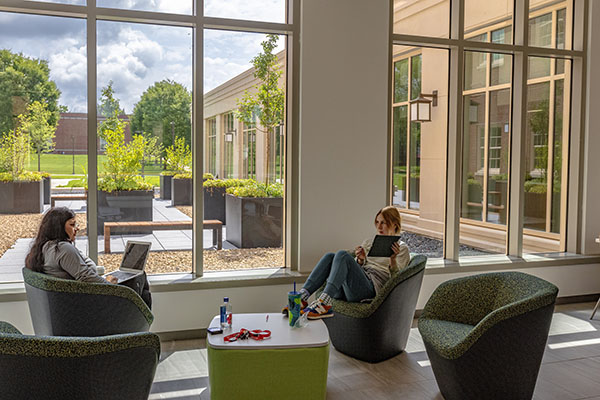Miami University’s new academic buildings and recent renovations are LEED Silver-certified
Miami’s 36 LEED Gold- and Silver-certified buildings account for 36% of the building square footage on the Oxford campus

Miami’s 36 LEED Gold- and Silver-certified buildings account for 36% of the building square footage on the Oxford campus

Miami University recently earned three silver certifications, plus one silver pending, for LEED (Leadership in Energy and Environmental Design) Building Design + Construction by the U.S. Green Building Council (USGBC).
Miami’s new academic buildings — Clinical Health Sciences and Wellness, which opened June 2023, and McVey Data Science, which opened in January — were certified LEED Silver. The recent renovation of Dodds Hall was also certified Silver, and the renovation of Ogden Hall, which reopens this fall, is pending Silver certification.
LEED building principles and green building strategies address a structure’s planning, design, construction, and operations while considering energy, water, indoor environmental quality, materials selection, and location. LEED rewards the implementation of these strategies through credits that support energy- and resource-efficient buildings and that also protect the health and well-being of those who interact with them, according to the USGBC.
Buildings account for 39% of global energy related carbon emissions: 28% from operational emissions (from energy needed to heat, cool, and power them) and 11% from materials and construction, according to the World Green Building Council.
High-performing green buildings, particularly LEED-certified buildings, provide the means to reduce the climate impacts of buildings and their inhabitants, according to the USGBC.
The Clinical Health Sciences and Wellness building received LEED Innovation points for interior lighting; designing with nature, biophilic design for the indoor environment; and joint use of facilities.
McVey Data Science received LEED Innovation points for PBT (persistent bioaccumulative and toxic) chemical source reduction associated with the life cycle of building materials; a reduced parking footprint; and a plan for development of a green building signage program, among other projects.
501 E. High Street
Oxford, OH 45056
1601 University Blvd.
Hamilton, OH 45011
4200 N. University Blvd.
Middletown, OH 45042
7847 VOA Park Dr.
(Corner of VOA Park Dr. and Cox Rd.)
West Chester, OH 45069
Chateau de Differdange
1, Impasse du Chateau, L-4524 Differdange
Grand Duchy of Luxembourg
217-222 MacMillan Hall
501 E. Spring St.
Oxford, OH 45056, USA
Mosler Hall 316
1601 University Blvd.
Hamilton, OH 45011